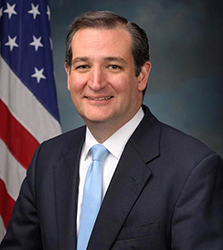
Cruz and Fiorina: Outsiders With Different Paths to Nomination
Patience is often rewarded on the campaign trail, and Texas Sen. Ted Cruz has demonstrated the quality as much as anyone in the chase for the Republican Party’s presidential nomination, at least according to an article this morning in The Hill:
Ted Cruz sees slow and steady path to 2016 presidential victory
Ted Cruz is playing a slow and steady campaign but for the firebrand Texas senator, that doesn’t translate into being quiet.
In the past week alone, he has stolen supporters from fellow candidate Rand Paul, won the rousing support of evangelicals and had to be shut down by Senate leaders for trying to complicate efforts on a short-term funding extension with a protest vote against Planned Parenthood funding.
That reflects Cruz's efforts to try to emerge as the consensus anti-establishment candidate if and when the top three outsider candidates, and his biggest rivals, peter out.
The anti-establishment lane is pretty crowded in the GOP field (as are all the other lanes), and Cruz at this point is probably in fourth place behind businessman Donald Trump, businesswoman Carly Fiorina, and neurosurgeon Ben Carson. But Cruz seems to see a path to the nomination and it’s hard to conclude he’s not on to something:
[Cruz spokesperson Rick] Tyler sees the GOP primary electorate as four distinct “brackets” of voters—libertarian, evangelical, Tea Party, and establishment candidates—and it’s clear that Cruz continues to make a play for all but the latter….
GOP strategists say he’s in a solid position to be the first choice of other candidates' supporters once their favorite drops out.
“If you look at where the Carson vote goes, the Huckabee vote eventually goes, the [Rick] Santorum vote, or the Rand Paul vote eventually goes, Cruz is very well positioned to be the default choice of supporters of a lot of other candidates,” Austin, Texas-based GOP strategist Matt Mackowiak said.
The article goes on to note that in order for Cruz’s strategy to succeed, the other anti-establishment candidates in front of him need to collapse or at least fade in time for him to pick up their supporters. A Trump collapse in January would probably benefit Cruz, but the effect would be diluted if Carson and Fiorina are still in the race at that point and have the funding and poll support to continue for several more months.
And at some point Cruz would likely need to get some segment of the GOP establishment to jump on board, possibly in response to another candidate who is deemed unacceptable to them.
Another article this morning suggests that Fiorina, running in that same anti-establishment lane as Cruz, may stand a better chance at consolidating establishment support behind her if she appears to be one of the final contenders. From Bloomberg Politics:
Carly Fiorina is looking like the insider's outsider candidate….
Yet, as she recently demonstrated when otherwise-feuding Republican lawmakers showed up to see her on Capitol Hill, she also has Washington credentials that have won her fans inside the Beltway, even as she seeks the nomination with a strategy that makes the GOP establishment a frequent punching bag.
“I think she understands the way Washington works,” said Michigan Representative Candice Miller, who attended the meeting and recently became one of the first members of Congress to endorse Fiorina.
Miller rejected the idea that Fiorina is some kind of “creature of Washington,” but she has spurred big-time interest among those who walk the halls of Congress, judging by the 50 or so legislators who Miller said went to see her speak.
The article suggests Fiorina’s ability to potentially straddle the establishment/outsider fence in part relates to her background:
Yet Fiorina is no political neophyte, either. The daughter of an influential federal judge, she served on advisory boards to the National Security Agency and Central Intelligence Agency and hit the stump as a surrogate for 2008 Republican presidential nominee John McCain, hardly a darling of grassroots conservatives. She challenged Democratic Senator Barbara Boxer of California in 2010, raising almost $16 million and securing endorsements from Republican luminaries like former Secretary of State Condoleezza Rice and former first lady Nancy Reagan for the unsuccessful effort. After that race, Fiorina and her husband moved to northern Virginia, on the outskirts of D.C.
“She is certainly not an insider in the traditional political sense, but she certainly is not a naif who just came in off the pumpkin patch,” said Robert Deitz, a former NSA general counsel and counselor to CIA Director Michael Hayden who worked with Fiorina on both intelligence boards and is supporting her campaign. More people in the intelligence community might be ready to get behind her, Deitz said, especially as they see more of her political acumen and grasp of policy issues.
“She is a mainstream, albeit conservative, Republican,” Deitz said. “She’s not Donald Trump, for Christ sakes, or Sarah Palin.” (McCain’s campaign sidelined Fiorina after she criticized his pick of Palin as the vice presidential nominee.)
Even though both Cruz and Fiorina have identified the support of anti-establishment voters as their path to the nomination, they have different strategies. Cruz seems to be waiting for other anti-establishment candidates to drop in order to consolidate that support behind him, while Fiorina apparently wants to add establishment-oriented supporters to her outsider base. Which strategy actually works could go a long way toward determining the nominee.



